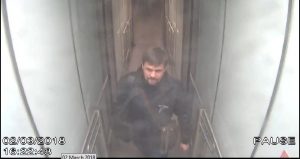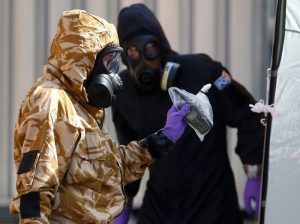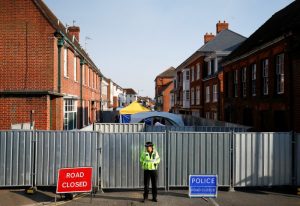
By Guy Faulconbridge and Andrew MacAskill
LONDON (Reuters) – The daughter of former Russian double agent Sergei Skripal is getting better after spending three weeks in critical condition due to a nerve toxin attack at his home in England, the hospital where she is being treated said on Thursday.
After the first known use of a military-grade nerve agent on European soil since World War Two, Britain blamed Russian President Vladimir Putin for the attempted murder, and the West has expelled around 130 Russian diplomats.
Russia has denied using Novichok, a nerve agent first developed by the Soviet military, to attack Skripal. Moscow has said it suspects the British secret services are trying to frame Russia to stoke anti-Russian hysteria.
British counter-terrorism police said they now believe Skripal and his 33-year-old daughter Yulia were poisoned with a nerve toxin that had been left on the front door of their home in the genteel English cathedral city of Salisbury.
“I’m pleased to be able to report an improvement in the condition of Yulia Skripal,” Christine Blanshard, Medical Director for Salisbury District Hospital, said in a statement.
“She has responded well to treatment but continues to receive expert clinical care 24 hours a day,” she said.
Her father remained in a critical but stable condition, the hospital said. Last week, a British judge said the Skripals might have suffered permanent brain damage as a result of the attack.
Police said on Thursday they had placed a cordon around a children’s play area near the Skripal’s modest house as a precaution.
Yulia and her 66-year-old father were found slumped on a bench outside a shopping center in Salisbury on March 4.
Britain has blamed the attempted murder on Russia, and expelled 23 Russians it said were spies working under diplomatic cover in retaliation.
Russia, which denies carrying out the attack, responded by throwing out 23 British diplomats. Moscow has since accused the British secret services of trying to frame Russia to stoke anti-Russian hysteria.
“ENOUGH IS ENOUGH”
The attack on Skripal, a former colonel in Russian military intelligence who betrayed dozens of Russian agents to Britain’s MI6 spy service, has plunged Moscow’s relations with the West to a new post-Cold War low.
British Foreign Secretary Boris Johnson said late on Wednesday the Kremlin had underestimated the Western response to the attack, which also injured a British policeman.
Johnson told an audience of ambassadors in London that 27 countries had now moved to expel Russian diplomats over Moscow’s suspected involvement.
“These expulsions represent a moment when a feeling has suddenly crystallized, when years of vexation and provocation have worn the collective patience to breaking point, and when across the world – across three continents – there are countries who are willing to say enough is enough,” Johnson said.
Maria Zakharova, a spokeswoman for Russia’s Foreign Ministry, told reporters in Moscow on Thursday Britain was breaking international law by refusing to provide information on Yulia Skripal despite the fact she was a Russian citizen.
Kremlin spokesman Dmitry Peskov said Russia was watching closely a media report that Britain might limit London’s role in marketing Russian debt to investors.
Skripal, recruited by British spies while in Spain, ended up in Britain after a Cold War-style spy swap that brought 10 Russian spies captured in the United States back to Moscow in exchange for those accused by Moscow of spying for the West.
His house, which featured a good-luck horseshoe on the front door, was bought for 260,000 pounds ($360,000) in 2011. Skripal was listed as living there under his own name.
Since emerging from the world of high espionage and betrayal, he has lived modestly in the cathedral city of Salisbury and kept out of the spotlight until he and his daughter were found unconscious on March 4.
In the years since he found refuge in Britain, he lost both a wife and son.
The attack on Skripal has been likened to the killing of ex-KGB agent Alexander Litvinenko in Britain. Litvinenko, a critic of Putin, died in London in 2006 after drinking green tea laced with radioactive polonium 210.
Russia denied any involvement in that killing.
An inquiry led by senior British judge Robert Owen found that former KGB bodyguard Andrei Lugovoy and another Russian, Dmitry Kovtun, carried out the murder of Litvinenko as part of an operation probably directed by Russia’s Federal Security Service.
(Additional reporting by Michael Holden and Costas Pitas in London and Vladimir Soldatkin in Moscow; Writing by Richard Balmforth and Guy Faulconbridge; Editing by Gareth Jones and Raissa Kasolowsky)












